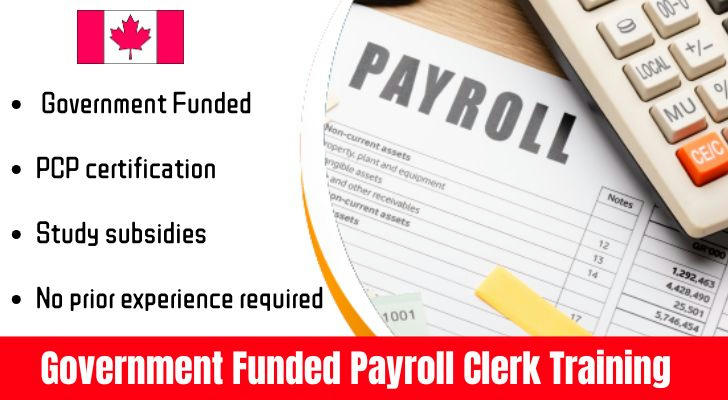Government Funded Payroll Clerk Training In Canada – Get Paid to Train
🔎 Helping you find reliable and rewarding training opportunities across Canada.
🟥No prior experience required| Government Funded | PCP certification | Study subsidies🟥
Are you stuck in a job with no growth or struggling to re-enter the workforce after a layoff? Many Canadians face this challenge — they want stability, but lack the skills to move into administrative or accounting roles. The good news is, you can now get government-funded Payroll Clerk training that helps you earn new credentials while getting paid to learn.

Advantages of Government-Funded Training
- No upfront tuition – eligible applicants can have 100% of tuition and materials covered.
- Get paid to train – programs like Second Career Ontario and Job Grants offer living allowances during study.
- Fast certification – most Payroll Clerk courses finish within 24 weeks.
- High employment rate – Payroll Administrators are in demand in every industry.
- Flexible study options – in-class or online learning available across provinces.
- Career pathway – training can lead to official certification as a Payroll Compliance Professional (PCP).
Available Programs Across Canada
- Academy of Learning Career College (AOLCC) – 24-week Payroll Clerk Certificate; eligible for both federal and provincial funding (B.C.).
- CCBST Payroll Administrator Diploma – Ontario-based program recognized by Second Career and OSAP.
- CLI College – Accounting & Payroll Administration – Alberta program with full financial aid options.
- Humber College PCP Certification Pathway – Advanced route for those pursuing national payroll certification.
Who Should Apply
- Individuals seeking a career change from retail, service, or marketing to a more stable office environment.
- Job seekers who are unemployed or underemployed and want to boost employability.
- Professionals aiming to gain administrative or financial office skills for career advancement.
- Parents or mid-career workers seeking flexible or remote-friendly positions.
- Mature workers looking for low-stress, stable employment before retirement.
Application Steps
- Identify your province – funding and approved colleges vary by region.
- Choose an eligible training provider – select from approved colleges (AOLCC, CCBST, CLI, etc.).
- Prepare supporting documents – include proof of residency, work history, and income status.
- Submit application to a government program:
- Second Career Ontario
- Canada–Ontario Job Grant (COJG)
- Canada–Alberta Job Grant (CAJG)
- Attend an orientation or interview – assess eligibility and training goals.
- Begin training and receive funding – tuition is paid directly to the institution; living allowance or stipend may be issued.
Eligibility Requirements
- Must be a Canadian citizen, permanent resident, or protected person.
- Must be unemployed, underemployed, or seeking career transition.
- Reside in a participating province (Ontario, B.C., Alberta, etc.).
- Meet admission standards of the chosen college (usually high school completion or equivalent).
- Demonstrate commitment to completing the program.
Other Related Online Courses
If you prefer remote learning, consider:
- Payroll Fundamentals 1 & 2 (CPA Canada) – national online courses recognized by employers.
- QuickBooks and Excel for Payroll – short online certifications offered by Coursera and Udemy.
- Accounting & Bookkeeping Foundations – ideal for those wanting a broader finance background.
Learning Goals by Age Group
- Ages 18–25: Focus on building core administrative and payroll skills to secure a first stable office role.
- Ages 26–40: Strengthen technical and certification-based knowledge to transition from general office or service jobs into payroll or HR administration.
- Ages 41–55: Refresh digital and compliance skills to stay competitive or re-enter the workforce after a career break.
- Ages 56+: Gain simplified payroll system experience for part-time, freelance, or consulting opportunities before retirement.
Conclusion
A Payroll Clerk role offers stability, flexibility, and career growth, making it an excellent choice for anyone looking to re-skill. Through government-funded programs, Canadians can now gain professional payroll training without financial burden — and even get paid while learning. Whether you’re 25 or 55, this is your opportunity to secure a future-proof career in the administrative and finance field.
👉 Explore eligible programs at your local career college or provincial training website today and start your funded journey toward becoming a certified Payroll Clerk.
